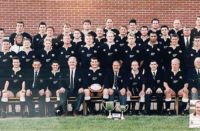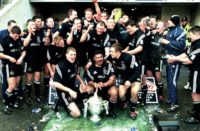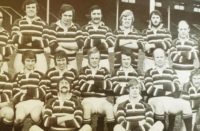 SUNDAY December 13, forty years ago, was the moment that a team of rugby players, who had been forced to the very limits of endurance, feared would never arrive – the occasion of their rescue.
SUNDAY December 13, forty years ago, was the moment that a team of rugby players, who had been forced to the very limits of endurance, feared would never arrive – the occasion of their rescue.
The Old Christians’ players had been trapped for an incredible 72 days in the inhospitable Chilean Andes after their plane crashed en route from Uruguay to Chile.
They had been travelling to Santiago to play a match against the Old Boys, but they ended up playing for their lives.
Before they were rescued, they had been written off as dead – and even the survivors could understand why almost everyone thought that way.
Daniel Fernandez, 66, said: “If someone had told me that, ‘you’re going to be put on a mountain at an altitude of 4,000-metres, at 20C below zero, wearing short sleeves,’ I would have said I’d survive ten minutes. But I survived 72 days.”
 The story captured the world’s attention and generated books and films. Part of the reason was that the 16 survivors out of the 45 passengers had been forced to eat human flesh to stay alive.
The story captured the world’s attention and generated books and films. Part of the reason was that the 16 survivors out of the 45 passengers had been forced to eat human flesh to stay alive.
Roberto Canessa, 59, who along with Fernando Parrado trekked for ten gruelling days in the mountains before eventually finding help, said: “I think the greatest sadness I felt in my life was when I had to eat a dead body. I would ask myself, ‘is it worth doing this?’ And it was because it was in order to live and preserve life, which is exactly what I would have liked for myself if it had been my body that lay on the floor.”
In October, the players returned to Santiago to mark the 40th anniversary of the crash. They were received by the Chilean president Sebastian Piñera in the presidencial palace, they unveiled a plaque with the photos of those who died and they played rugby as part of their visit.
There was also an emotional moment when the survivors met up with livestock herder Sergio Catalan.
It was Catalan, now 90 years old, who encountered Canessa and Parrado after they had struggled for ten days across the mountains. He went on horseback to alert the authorities and begin the rescue process.
Andres Allamand, defence minister in October but now beginning his campaign to become the next Chilean president, highlighted the “courage” of the players.
Allamand, who played rugby for the national team between 1976 and 1983, said: “That they are here 40 years later is a demonstration of the friendship of the Uruguayans and the Chileans.
“This group of players are absolutely exceptional and they gave an example to the world.
“It has been a day of symbolism. We need the values of rugby in our daily life – to win with humility and to lose with dignity.”
 Ironically, on the same day the Uruguayans visited the ‘Palacio de La Moneda’, so too did some of the Chilean miners rescued after 69 days below ground in 2010.
Ironically, on the same day the Uruguayans visited the ‘Palacio de La Moneda’, so too did some of the Chilean miners rescued after 69 days below ground in 2010.
They were there to mark the second anniversary of their rescue, another story that captured the world’s attention.
But there are some parts of the story of the rugby players that aren’t well known.
One is the incredible bond that has developed between the two clubs involved ever since the crash four decades ago.
In 1974, two years after the accident, ‘the game that never was’ finally took place with the 16 survivors. It was the beginning of a history of close ties, encapsulated by the ‘Friendship Cup’ (Copa de la Amistad).
What began as a rugby clash has expanded to include hockey, football and a range of other activities. Many of the children and grandchildren of the survivors are now involved.
Chilean minister of agriculture Luis Mayol was in the Old Boys squad at the time of the disaster.
He said: “The tragedy has not only marked them, but us also. I was part of the team that was awaiting them, I was one of the youngest.
“We participated in the search with the families and we have a connection with a tragedy that was so grand, that has marked us all our lives.
“Since then we have become great friends and we see each other regularly. It is a relationship practically of brothers.
“Our sons and families are friends and we have seen how this has developed over the years.”
Survivor Alvaro Mangino added: “To me, the friendship is something we must keep forever, passing down from generation to generation.”
It has shown that, from the darkest despair, there can come light.
JOHN LYONS























